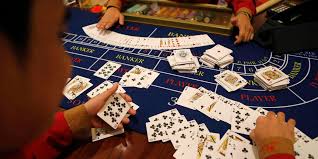
Online gambling has quietly become one of the fastest-growing forms of entertainment in Pakistan. As access to the internet has expanded and smartphones have become ubiquitous, more Pakistanis are turning to online gambling platforms, where they can place bets on cricket matches, play casino games, or participate in poker tournaments—all from the comfort of their homes. However, beneath the surface of this digital gambling boom lies a darker reality: widespread addiction, financial ruin, and a growing black market that continues to thrive despite the country’s strict legal framework.
While gambling in any form is illegal in Pakistan, the rise of online gambling has presented unique challenges for law enforcement and regulatory bodies. The anonymity of the internet and the ease with which players can access foreign gambling websites make it difficult for authorities to track and regulate the activity. This has allowed online gambling to proliferate, with serious consequences for individuals, families, and society at large.
The Growing Popularity of Online Gambling
Cricket, Pakistan’s national obsession, plays a significant role in driving online gambling. Sports betting, particularly during major cricket events like the Pakistan Super League (PSL) or international matches, has become an enticing way for individuals to engage with the game. Many online gambling sites offer live betting options, allowing users to place wagers in real-time as they watch the match unfold. The excitement of real-time betting, combined with the potential for quick financial gain, makes online gambling particularly alluring for Pakistanis, especially the youth.
However, the appeal of online gambling is not limited to cricket betting. Digital casinos, poker rooms, and slot machines have gained a significant following, offering players a variety of gambling options that were previously unavailable in Pakistan. Online platforms have made it easy for anyone with a smartphone and an internet connection to engage in these activities—often without any oversight or regulation.
The Dark Side: Addiction, Financial Ruin, and Social Impact
As online gambling has become more accessible, so too have the risks associated with it. The anonymity and convenience of online platforms make it particularly dangerous for individuals who may already be vulnerable to addiction. Gambling addiction can develop quickly, with players often placing larger and riskier bets to try and recover their losses. The nature of online gambling, with its constant availability and 24/7 access, makes it difficult for players to take a break or set limits, which only exacerbates the problem.
The financial consequences of online gambling addiction can be severe. Many individuals end up losing significant sums of money, with some resorting to desperate measures to fund their habits. Reports have emerged of people selling property, taking out loans, or even borrowing from loan sharks to cover their gambling debts. The financial strain often leads to personal and family crises, with relationships deteriorating and individuals facing mental health issues like depression and anxiety.
Beyond the individual level, the rise of online gambling is also fueling a broader social crisis. Organized crime syndicates have increasingly capitalized on the demand for online gambling. These groups often run illegal gambling operations, laundering money through online betting platforms, and exploiting vulnerable gamblers. The lack of regulation allows these criminal organizations to thrive, further exacerbating the social and economic costs associated with gambling.
Legal and Regulatory Challenges
In Pakistan, gambling is prohibited under the Prevention of Gambling Act, 1977, yet the rise of online gambling has made enforcement nearly impossible. The digital nature of these platforms means that gamblers can easily access foreign websites, which are not subject to Pakistani laws. Even when the government attempts to block access to these sites, new platforms continuously emerge, often with more sophisticated methods of evasion.
Pakistan’s telecommunications and internet regulations are still ill-equipped to handle the challenges posed by online gambling. While the government has tried to crack down on gambling-related activities by blocking websites and arresting offenders, the sheer scale and scope of the issue make it nearly impossible to eradicate. Additionally, online gambling often occurs on international platforms, which complicates any legal actions Pakistan can take against operators based outside the country.
The absence of a legal framework for regulating online gambling leaves a gap where black-market gambling can flourish. These unregulated markets often come with added risks, such as fraud, identity theft, and scams, where individuals are coerced into depositing funds into untrustworthy websites. Moreover, there is no protection for individuals who fall victim to these scams, as the anonymity of online platforms makes it hard to hold operators accountable.
The Psychological Toll: Mental Health and Social Stigma
The psychological effects of online gambling addiction in Pakistan are profound. Many individuals who develop a gambling habit experience mental health issues, such as anxiety, depression, and stress. The constant worry about losing money, the thrill of placing bets, and the shame of addiction often take a toll on the person’s mental well-being. Suicidal thoughts and emotional breakdowns are not uncommon, especially when gamblers face mounting debts and feel trapped by their addiction.
The stigma surrounding gambling addiction in Pakistan further complicates the issue. Gambling is widely regarded as a moral failing, and the shame associated with it prevents many individuals from seeking help. In a society where honor and reputation are highly valued, admitting to gambling addiction can be seen as a social taboo, leaving many to suffer in silence.
While some gamblers may seek help from informal support groups or religious institutions, there is a severe lack of professional addiction treatment services for gambling-related issues in Pakistan. This lack of proper rehabilitation centers or psychological support makes it even more challenging for those struggling with addiction to recover.
The Path Forward: Raising Awareness and Improving Regulation
To combat the growing issue of online gambling in Pakistan, a more proactive approach is needed. The government must strengthen cybersecurity measures and online regulations to better track and block gambling websites. While complete eradication of online gambling may not be realistic, effective regulation can help mitigate the risks associated with it and prevent unregulated platforms from exploiting vulnerable individuals.
Moreover, raising public awareness about the dangers of online gambling is crucial. Educational campaigns that emphasize the psychological and financial risks associated with gambling addiction could help reduce the stigma surrounding the issue, making it easier for individuals to seek help. Mental health support and addiction recovery services must also be expanded to offer specialized treatment for those affected by gambling.
In conclusion, while online gambling has become a significant issue in Pakistan, the right combination of regulation, awareness, and support can help mitigate its negative effects. Addressing the dark side of online gambling is crucial not only for protecting individuals but also for safeguarding the integrity of Pakistani society. Without a concerted effort from both the government and civil society, the long-term consequences of online gambling could prove to be a serious social crisis.
Experience Thrills and Big Rewards at KKClub Casino – Pakistan’s Premier Gaming Hub!



